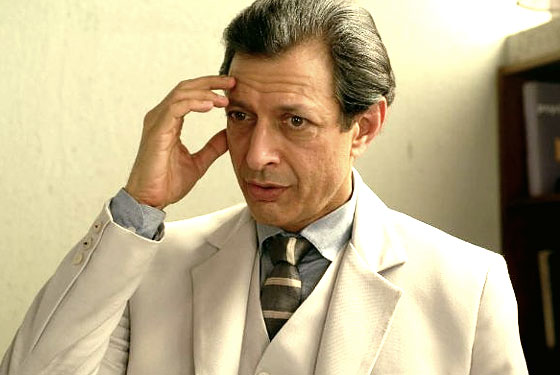
For Jeff Goldblum, the balancing act between disappearing into a part and maintaining his branded sensibility is nothing new. Still, his performance in Adam Resurrected, Paul Schrader’s challenging adaptation of Israeli author Yoram Kaniuk’s acclaimed 1968 novel, is striking: Playing Adam Stein, a German circus performer who survives the Holocaust but finds himself in an Israeli asylum with other Holocaust survivors when he can’t cope with his memories, Goldblum has not only to affect a German accent but also has to run through an almost inconceivable gamut of emotions. All this while he’s also been cast on Law & Order. Goldblum spoke to Vulture about his new part, his old part — his turn in Annie Hall — and his fears about tackling such a legendary book.
Is this the first time you’ve had to do an accent on film?
I’ve done it in a play or two, but in a movie, I think it is the first time. I didn’t know if I would do it at first. I’d also seen films where American actors played prisoners in concentration camps and used their regular American accents. But they had cast of three spectacular German actors in the film – Joachim Krol, Juliane Kohler, and Moritz Bleibtreu. So I worked on an accent with a dialect person in L.A., then I went to Berlin for a month and worked on it there.
Did you have any qualms about taking on a novel that was so legendary and beloved in Israel?
Absolutely. The book was actually very controversial when it came out — it had the same tone as The Tin Drum, Catch 22, and Slaughterhouse Five. Only after some time did it become an internationally celebrated book, when Susan Sontag compared it to Garcia Marquez and Faulkner. But even when it was published, Charlie Chaplin had called Yoram Kaniuk over the phone and barked about how he had to play this part. And Orson Welles had also wanted to make it a movie at one point. It was actually very helpful to meet with Kaniuk, who was a very generous and helpful guy. I could see that much of the sensibility of the book is him. He’s snarky and dark and hilarious and brilliant and contradictory and unexpected at every turn. It was also a sobering and alerting challenge. I’d talked to a lot of Holocaust survivors in L.A. and Europe. I knew I had to do my best to meet everyone’s expectations.
It seems to me you’re doing more personal projects these days, taking bigger risks.
I’ve always been able to pick projects for myself, but yes, I think in recent years that’s been more the case. My great teacher Sandy Meisner always said, “Don’t copy anybody. Always try to find your own unique way.” The whole endeavor of acting has been a wild-hearted adventure for me. As I get better and better, I feel like I can take more risks. I certainly have more of an appetite for it.
Is it ever difficult to put your own personal stamp on roles in big-budget films or big franchises like Jurassic Park, Law & Order, Independence Day?
Not really. I liked making those movies. Even though Jurassic Park was a big franchise movie, I appreciated how Steven Spielberg was very character-oriented and very independent in spirit. It was inspiring to work with him.
In Annie Hall, you had a tiny but famous part as a person at an L.A. party on the phone saying he’d forgotten his mantra. As someone who studied the Meisner technique, which says to build emotional lives for your characters, did you actually have a mantra in mind? And if so, what was it?
I did have something specific in mind. My character was obviously supposed to be a California New Age spiritual type. In fact, I myself was not unfamiliar with transcendental meditation myself. I studied TM. When you’re initiated and they give you your mantra, your initiator whispers in your ear. It’s purposefully designed for you, and it must never be spoken aloud or told to anyone. So I adhered to that, even in the imaginary world. So I can’t tell you.


